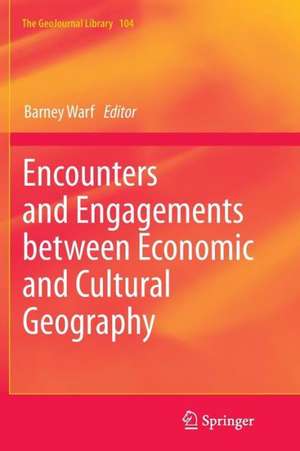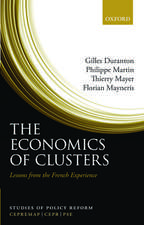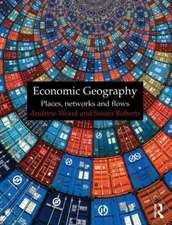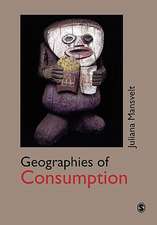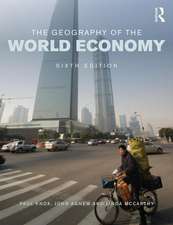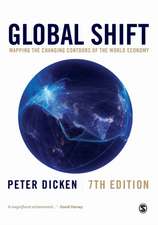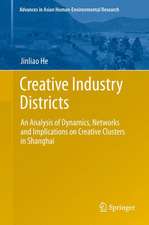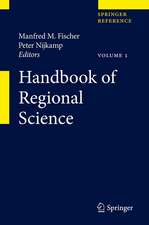Encounters and Engagements between Economic and Cultural Geography: GeoJournal Library, cartea 104
Editat de Barney Warfen Limba Engleză Paperback – 9 mai 2014
| Toate formatele și edițiile | Preț | Express |
|---|---|---|
| Paperback (1) | 635.31 lei 6-8 săpt. | |
| SPRINGER NETHERLANDS – 9 mai 2014 | 635.31 lei 6-8 săpt. | |
| Hardback (1) | 641.53 lei 6-8 săpt. | |
| SPRINGER NETHERLANDS – 5 apr 2012 | 641.53 lei 6-8 săpt. |
Din seria GeoJournal Library
- 15%
 Preț: 642.51 lei
Preț: 642.51 lei - 15%
 Preț: 632.70 lei
Preț: 632.70 lei -
 Preț: 396.78 lei
Preț: 396.78 lei - 18%
 Preț: 948.92 lei
Preț: 948.92 lei -
 Preț: 430.59 lei
Preț: 430.59 lei - 18%
 Preț: 899.69 lei
Preț: 899.69 lei - 15%
 Preț: 581.79 lei
Preț: 581.79 lei - 18%
 Preț: 938.34 lei
Preț: 938.34 lei - 18%
 Preț: 888.80 lei
Preț: 888.80 lei - 15%
 Preț: 703.85 lei
Preț: 703.85 lei - 18%
 Preț: 890.68 lei
Preț: 890.68 lei - 24%
 Preț: 777.65 lei
Preț: 777.65 lei -
 Preț: 400.65 lei
Preț: 400.65 lei - 18%
 Preț: 785.55 lei
Preț: 785.55 lei - 18%
 Preț: 946.55 lei
Preț: 946.55 lei - 15%
 Preț: 661.02 lei
Preț: 661.02 lei - 18%
 Preț: 945.79 lei
Preț: 945.79 lei - 15%
 Preț: 637.28 lei
Preț: 637.28 lei - 15%
 Preț: 637.59 lei
Preț: 637.59 lei - 15%
 Preț: 637.46 lei
Preț: 637.46 lei - 20%
 Preț: 568.44 lei
Preț: 568.44 lei - 15%
 Preț: 645.79 lei
Preț: 645.79 lei - 20%
 Preț: 569.86 lei
Preț: 569.86 lei - 15%
 Preț: 651.99 lei
Preț: 651.99 lei - 15%
 Preț: 639.41 lei
Preț: 639.41 lei - 15%
 Preț: 643.48 lei
Preț: 643.48 lei - 15%
 Preț: 663.60 lei
Preț: 663.60 lei - 15%
 Preț: 651.99 lei
Preț: 651.99 lei - 15%
 Preț: 651.02 lei
Preț: 651.02 lei -
 Preț: 390.63 lei
Preț: 390.63 lei -
 Preț: 395.63 lei
Preț: 395.63 lei
Preț: 635.31 lei
Preț vechi: 747.43 lei
-15% Nou
Puncte Express: 953
Preț estimativ în valută:
121.58€ • 132.02$ • 102.13£
121.58€ • 132.02$ • 102.13£
Carte tipărită la comandă
Livrare economică 22 aprilie-06 mai
Preluare comenzi: 021 569.72.76
Specificații
ISBN-13: 9789400797468
ISBN-10: 940079746X
Pagini: 192
Ilustrații: X, 182 p.
Dimensiuni: 155 x 235 x 10 mm
Greutate: 0.28 kg
Ediția:2012
Editura: SPRINGER NETHERLANDS
Colecția Springer
Seria GeoJournal Library
Locul publicării:Dordrecht, Netherlands
ISBN-10: 940079746X
Pagini: 192
Ilustrații: X, 182 p.
Dimensiuni: 155 x 235 x 10 mm
Greutate: 0.28 kg
Ediția:2012
Editura: SPRINGER NETHERLANDS
Colecția Springer
Seria GeoJournal Library
Locul publicării:Dordrecht, Netherlands
Public țintă
ResearchCuprins
Introduction: Fusing Economic and Cultural Geography: Barney Warf.- Chapter 1 A Short Cultural History of Anglo-American Economic Geography: Bodies, Books, Machines, and Places:Trevor Barnes.- Chapter 2 The Cultural Turn in Geography: A New Link in the Commodity Chain: Elaine Hartwick.- Chapter 3 Consumption Geographies: Turns or Intersections?: Juliana Mansvelt.- Chapter Gender, Commodity Chains and Everyday Life: Deborah Leslie.- Chapter 5 Economic Rationality, Ethnic Identity, and the Geographies of Consumption: Lucia Lo and Lu Wang.- Chapter 6 Trust and Distrust: Culture Finding its Way into Economics or the Other Way Round?: Geir Oderud.- Chapter 7 Building the Beloved Community through Techno Music Production in Detroit: Deborah Che.- Chapter 8 Exploring the Role of Networks in the Creative Economy of Northeast England: Economic and Cultural Dynamics: Roberta Comunian.- Chapter 9 The Relevance of Scale Economies in Economic and Social Relationships in the New Economic Geography:Luca Spinesi.- Chapter 10 Consuming the Spectacle: Tourism and Communication Technologies in Santiago de Compostela: Carlos Ferrás Sexto and Yolanda García Vázquez.
Textul de pe ultima copertă
The intellectual renaissance of human geography has included a widespread engagement between its economic and cultural subdisciplines. This volume adopts a variety of conceptual and empirical perspectives on the encounters between economic and cultural geographers. It offers an introduction and 10 chapters by authors in a variety of national contexts to explicate issues such as the cultural turn in economic geography, the cultural construction of economic geographic thought, consumption, gender, everyday life, commodity chain analysis, trust, networks, the creative economy, and tourism. The volume contains empirical analyses utilizing both quantitative and qualitative approaches at spatial scales ranging from the individual to the global economy. In illustrating how human geographers can ill afford to subscribe to the analytically false dichotomy between “culture” and “the economy,” the book explicates how cultural and economic geography can be seamlessly integrated , bringing theminto a creative tension to their mutual benefit.
Caracteristici
First book-length examination of how cultural and economic geography have become interpenetrated Adopts a variety of conceptual and empirical perspectives on the encounters between economic and cultural geographers Contains empirical analysis utilizing both quantitative and qualitative approaches ?
